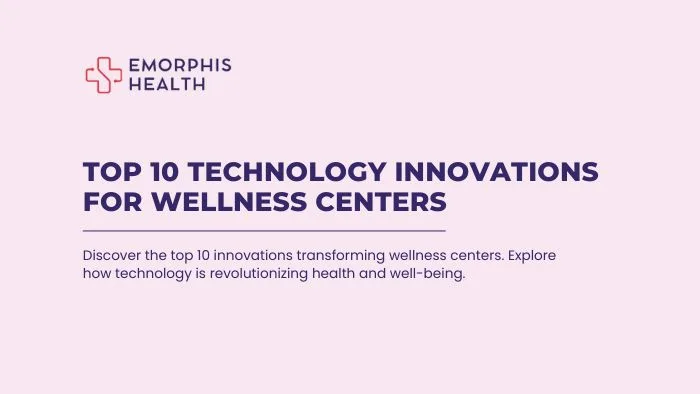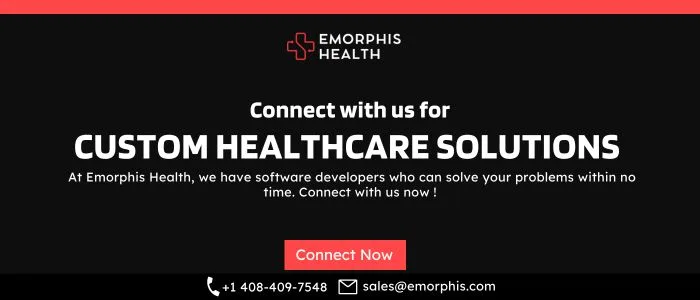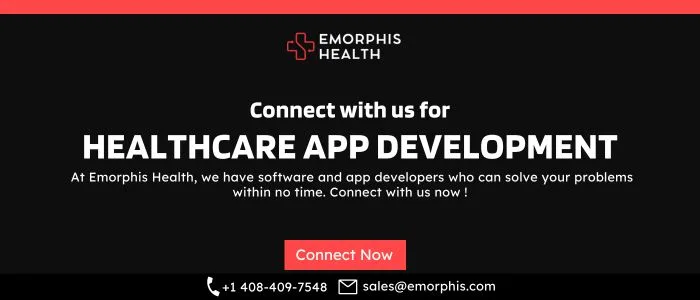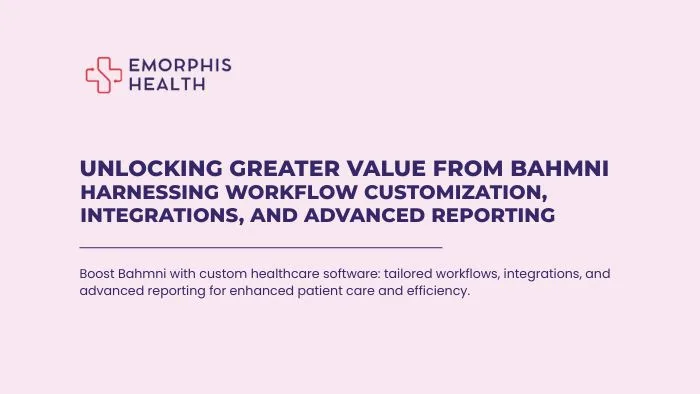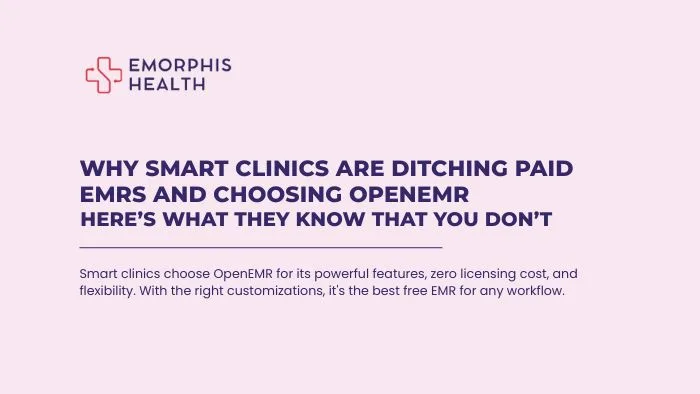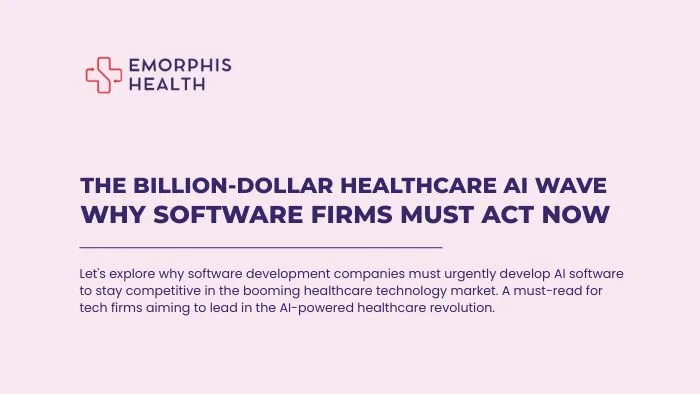Overview
See Contents
- 1 Overview
- 2 What Will you learn from this article?
- 3 Why Integrating Technology is Essential for Modern Wellness Centers?
- 4 Why Wellness apps are needed?
- 5 Top 10 Innovations in Technology – Reasons to Integrate Technology in Your Wellness Centers
- 6 Steps to Begin Integrating Technology into Your Wellness Center
- 7 The Future of Wellness Centers with Technology
- 8 Emerging Technologies for Enhanced Efficiency in Your Wellness Center
- 9 Enhancing Wellness Engagement with AI-Powered Solutions
- 10 How can Emorphis Health help your Wellness Center integrate Wellness Technology?
- 11 Conclusion
Wellness centers, focused on physical and mental well-being, are now leveraging cutting-edge technology to enhance their offerings and better serve their clients. In today’s rapidly evolving landscape, the synergy between Wellness and Technology is undeniable. These two realms are not merely coexisting but are dynamically shaping each other.
Wellness centers are no longer confined to traditional practices alone; they’re embracing technological advancements to offer more personalized and effective solutions. Moreover, this intersection is fostering innovation across various dimensions of wellness, from preventive care to holistic therapies.
Statistics reveal a compelling narrative about the growing influence of technology in the wellness sector. In fact, according to recent surveys, a significant percentage of wellness consumers express a preference for tech-enabled solutions. Moreover, the market for wellness technology is witnessing exponential growth, with projections indicating sustained momentum in the coming years.
What Will you learn from this article?
- Technology Enhances Wellness – Wellness centers now use cutting-edge technology for personalized and effective client solutions.
- Consumer Preference for Tech – Surveys show many wellness consumers prefer tech-enabled solutions, driving market growth.
- Smart Scheduling Systems – These systems streamline booking, personalize reminders, and optimize resource allocation, improving client experience.
- Telehealth Expands Reach – Virtual consultations and remote monitoring make wellness services accessible and convenient, overcoming geographic barriers.
- Mobile Wellness Apps – These apps provide custom plans, progress tracking, and community engagement, empowering clients to manage their health on the go.
Why Integrating Technology is Essential for Modern Wellness Centers?
As of September 2022, about 40% of U.S. adults reported high-stress levels negatively impacting their mental health. The global market for meditation and mental wellness apps, estimated at over $533 million in 2022, is projected to exceed $2.6 billion by 2028 as per a report from Statista. During the COVID-19 pandemic, mental wellness apps saw a 42% increase in downloads, reaching nearly 100 million globally.
By Q3 2022, U.S. meditation app usage rose from 12% in 2019 to 20%, particularly among 18-34-year-olds. Leading apps like Calm and Headspace generated significant revenues, with Calm earning over $6 million and Headspace around $3.7 million in May 2023. The market also includes diverse apps like BetterSleep, Daily Yoga, and Meditopia, catering to various wellness needs.
Integrating technology into wellness centers is not just advantageous but essential for providing convenience and efficiency. Technology enables wellness centers to offer tailored experiences, streamline operations, and reach a broader audience. Moreover, it empowers clients to take control of their health journey by providing access to real-time data and resources.
As we delve deeper into the role of technology in wellness centers, it becomes evident that embracing innovation is not merely an option but a strategic imperative for thriving in the modern wellness landscape.


Why Wellness apps are needed?
Top 10 Innovations in Technology – Reasons to Integrate Technology in Your Wellness Centers
1. Smart Scheduling Systems are Enhancing Efficiency and Client Experience
Smart Scheduling systems are revolutionizing the way wellness centers manage appointments. Automated Appointment Booking, one of the key features of these systems, streamlines the booking process for clients, eliminating the need for lengthy phone calls or in-person visits. Clients can easily book their appointments online at their convenience, saving both time and effort.
Moreover, these systems offer Personalized Reminders and Follow-Ups, ensuring that clients never miss their appointments and stay engaged throughout their wellness journey. Whether it’s a gentle reminder about an upcoming session or a follow-up message to check on their progress, personalized communication strengthens the bond between clients and wellness centers, fostering long-term relationships.
Furthermore, Efficient Resource Allocation is another significant advantage of smart scheduling systems. By optimizing appointment scheduling based on staff availability and facility resources, wellness centers can maximize their operational efficiency and minimize idle time. In fact, with real-time insights into appointment bookings and staff schedules, managers can allocate resources more effectively, ensuring that every client receives timely and high-quality service.
Incorporating smart scheduling systems into wellness centers not only enhances operational efficiency but also elevates the overall client experience. By automating appointment bookings, personalizing communication, and optimizing resource allocation, these systems empower wellness centers to deliver exceptional service while staying ahead in today’s competitive market.
2. Telehealth Services: Bridging Gaps and Extending Reach
In an era defined by connectivity and accessibility, Telehealth Services are transforming the way wellness centers deliver care, breaking down barriers and expanding reach like never before. Through Virtual Consultations and Therapy Sessions, clients can now access professional support from the comfort of their homes or while on the go. In fact, this convenient and flexible approach eliminates geographical constraints, enabling clients to connect with wellness experts regardless of their location.
Moreover, telehealth services encompass Remote Monitoring and Wearable Tech, allowing healthcare providers to remotely track clients’ vital signs, activity levels, and other health metrics. In fact, wearable devices equipped with sensors and connected to mobile apps enable real-time data collection, providing valuable insights into clients’ health status and progress. Furthermore, this proactive monitoring empowers clients to take charge of their well-being, promoting preventive care and early intervention.
Expanding Reach to Remote Clients is another significant advantage of telehealth services. By leveraging digital platforms and virtual communication tools, wellness centers can reach individuals in underserved or remote areas, offering them access to much-needed healthcare services. This democratization of healthcare not only improves health outcomes but also reduces disparities in access to care.
Incorporating telehealth services into wellness centers not only enhances convenience and accessibility but also enables more proactive and personalized care delivery. By embracing virtual consultations, remote monitoring, and expanding reach to remote clients, wellness centers can harness the power of technology to empower clients and promote holistic well-being.
3. Digital Health Records, Revolutionizing Healthcare Management
In the digital age, Digital Health Records (DHR) have emerged as a cornerstone of efficient and effective healthcare management. Through Electronic Health Records (EHR), wellness centers can streamline their operations, ensuring seamless coordination of care across all touchpoints. EHR systems digitize patient information, eliminating the need for paper-based records and reducing the risk of errors.
Furthermore, DHR systems prioritize Secure Client Data Storage and Access, safeguarding sensitive health information while ensuring accessibility to authorized personnel when needed. Robust encryption protocols and access controls protect against unauthorized access, maintaining the confidentiality and integrity of client data. Moreover, cloud-based storage solutions offer scalability and flexibility, allowing wellness centers to adapt to evolving data management needs.
Integration with Other Health Systems is another key advantage of DHR systems. By seamlessly connecting with electronic medical record systems, pharmacy databases, and laboratory information systems, wellness centers can facilitate interoperability and exchange of critical health information. This interoperability enhances care coordination, reduces duplication of efforts, and promotes continuity of care across healthcare settings.
4. Mobile Wellness Apps, Empowering Clients on the Go
In an increasingly mobile-centric world, Mobile Wellness Apps are empowering clients to take control of their health and fitness journey anytime, anywhere. These apps offer Custom Wellness and Fitness Plans, tailored to individual goals, preferences, and health conditions. From personalized workout routines to nutrition plans, clients can access a wealth of resources designed to support their well-being.
Moreover, mobile wellness apps enable Tracking Progress and Milestones, allowing clients to monitor their fitness levels, track activity metrics, and record achievements along the way. As a matter of fact, real-time feedback and progress tracking provide motivation and accountability, helping clients stay on track towards their wellness goals.
Furthermore, these apps play a pivotal role in Enhancing Client Engagement and Retention. Through features like gamification, social sharing, and community forums, clients can stay connected with peers, celebrate successes, and receive support during challenging times. Moreover, push notifications and reminders keep clients engaged and invested in their wellness journey, fostering long-term adherence to healthy habits.
Follow the link to check details on Healthcare App Development Services
5. Advanced Diagnostic Tools, Precision Healthcare at Its Best
Advancements in technology have ushered in a new era of healthcare with Advanced Diagnostic Tools that leverage artificial intelligence (AI) and real-time analysis to revolutionize disease detection and management. These tools enable the Use of AI in Health Assessments, harnessing machine learning algorithms to analyze complex data sets and identify patterns indicative of various health conditions.
Moreover, advanced diagnostic tools provide Real-time Analysis and Feedback, delivering actionable insights to healthcare providers at the point of care. This real-time decision support enhances clinical decision-making, enabling timely interventions and personalized treatment plans tailored to each client’s unique needs.
Furthermore, these tools offer Improved Accuracy in Diagnosing Conditions, minimizing the risk of diagnostic errors and ensuring more precise and reliable outcomes. By integrating AI-driven diagnostic algorithms with existing healthcare workflows, wellness centers can enhance diagnostic efficiency, reduce healthcare costs, and improve overall client satisfaction.
Incorporating digital health records, mobile wellness apps, and advanced diagnostic tools into wellness centers not only enhances operational efficiency and client engagement but also promotes precision healthcare delivery tailored to individual needs and preferences. By embracing these technological advancements, wellness centers can position themselves at the forefront of innovation, driving positive health outcomes for their clients.
6. Wearable Health Devices, Empowering Personal Wellness
In the age of personal health tracking, Wearable Health Devices have emerged as indispensable tools for individuals seeking to optimize their well-being. Popular devices like Smart Watches and Fitness Trackers offer continuous monitoring of vital signs and activity levels, providing users with valuable insights into their overall health and fitness. As a matter of fact, these devices track metrics such as heart rate, sleep patterns, and steps taken, allowing users to monitor their progress towards fitness goals in real-time.
Moreover, wearable health devices play a pivotal role in Encouraging Healthy Lifestyle Choices by promoting awareness and accountability. By visualizing data trends and setting achievable targets, users are motivated to adopt healthier habits and make positive lifestyle changes. Whether it’s taking more steps each day, getting better quality sleep, or staying hydrated, these devices serve as constant reminders to prioritize self-care.
7. Virtual Reality (VR) and Augmented Reality (AR), Transforming Wellness Experiences
Immersive technologies like Virtual Reality (VR) and Augmented Reality (AR) are revolutionizing the way wellness services are delivered, offering immersive and engaging experiences that transcend traditional boundaries. VR, for instance, is being utilized for Stress Relief and Meditation, transporting users to tranquil environments where they can unwind and practice mindfulness techniques. These virtual escapes provide a respite from the stresses of everyday life, promoting relaxation and mental well-being.
On the other hand, AR is enhancing Physical Therapy by overlaying digital elements onto the physical environment, facilitating interactive exercises and rehabilitation activities. By providing real-time feedback and guidance, AR technology helps patients perform exercises with proper form and technique, accelerating the recovery process and improving outcomes.
Furthermore, VR and AR offer Immersive Experiences for Client Engagement across various wellness modalities. From guided meditation sessions in virtual landscapes to interactive fitness classes with holographic instructors, these technologies captivate users’ attention and foster deeper levels of engagement. Moreover, by gamifying wellness activities and rewarding progress, VR and AR create a sense of enjoyment and accomplishment, motivating users to stay committed to their wellness goals.
8. AI-Powered Health Coaching, Personalized Support for Optimal Well-Being
In the era of personalized medicine, AI-Powered Health Coaching is transforming the way individuals approach their health and wellness journeys. These virtual coaches leverage artificial intelligence algorithms to deliver Personalized Recommendations and Adjustments based on individual health data, preferences, and goals. As a matter of fact, these recommendations are tailored to each user’s unique needs, providing actionable insights for improving health outcomes.
Moreover, AI-powered health coaches offer Real-time Guidance and support, responding to users’ inquiries and providing immediate feedback on their progress. Whether it’s adjusting exercise routines, modifying dietary habits, or addressing health concerns, these virtual coaches are available 24/7 to assist users on their wellness journey.
Furthermore, AI-driven health coaching provides Data-Driven Insights for better outcomes, analyzing vast amounts of health data to identify trends, patterns, and correlations. By leveraging this wealth of information, users gain a deeper understanding of their health status and behaviors, empowering them to make informed decisions and take proactive steps towards optimal well-being.
Incorporating wearable health devices, immersive technologies, and AI-powered health coaching into wellness centers not only enhances the client experience but also promotes personalized and proactive approaches to health and wellness. By embracing these cutting-edge technologies, wellness centers can empower individuals to achieve their wellness goals and lead healthier, happier lives.
9. IoT in Wellness Facilities, Transforming Environments for Enhanced Well-Being
The integration of IoT (Internet of Things) technology in wellness facilities is revolutionizing the way environments are managed and optimized to promote health and wellness. Through Smart Facility Management, wellness centers can create environments that cater to the holistic well-being of their clients. From intelligent lighting systems that adjust brightness levels to support circadian rhythms to climate control systems that maintain optimal temperature and humidity levels, IoT technology ensures that wellness facilities are conducive to health and comfort.
Moreover, IoT facilitates Automated Safety and Hygiene Protocols, ensuring that wellness centers adhere to stringent standards of cleanliness and safety. Smart sensors and monitoring devices can detect environmental factors such as air quality and sanitation levels, triggering automated cleaning processes and maintenance tasks as needed. This proactive approach to safety and hygiene instills confidence in clients and staff, fostering a sense of trust and security.
Furthermore, IoT technology enhances Client Comfort and Satisfaction by personalizing the wellness experience to individual preferences. From adjustable seating arrangements to customizable ambient settings, IoT-enabled features allow clients to tailor their surroundings to suit their needs and preferences. Moreover, real-time feedback mechanisms enable wellness centers to gather insights into client preferences and adjust amenities and services accordingly, ensuring a consistently high level of client satisfaction.
10. Interactive Online Portals, Empowering Clients Beyond the Wellness Center
In the digital age, Interactive Online Portals empower clients to access wellness services and resources anytime, anywhere. These portals offer Easy Access to Services like appointment scheduling and medical record access, enhancing convenience and satisfaction.
Additionally, online communities provide Support and Motivation, connecting clients with peers to share experiences and celebrate achievements. This fosters accountability and sustains motivation in wellness programs.
Moreover, portals offer Educational Resources, promoting health literacy and enabling informed decision-making. By leveraging IoT and online portals, wellness centers can tailor experiences, promote engagement, and empower clients to lead healthier lives.


Steps to Begin Integrating Technology into Your Wellness Center
1. Assess Your Need
Identify areas where technology can improve efficiency and enhance client experiences within your wellness center.
2. Research Emerging Technologies
Stay informed about the latest developments in healthcare technology and explore how they can be applied to your wellness center.
3. Invest in Training and Education
Provide staff with the necessary training and education to effectively utilize new technologies and adapt to changing workflows.
4. Collaborate with Technology Partners
Partner with technology companies and healthcare providers to implement and integrate innovative solutions into your wellness center.
5. Monitor and Evaluate
Continuously monitor the impact of technology on your wellness center’s operations and client outcomes, making adjustments as needed to optimize performance.
Now, let’s check what the future holds for your wellness center in terms of technology.
The Future of Wellness Centers with Technology
The future of wellness centers is intricately intertwined with technology, as advancements continue to drive innovation and transform the delivery of healthcare services. By embracing emerging technologies, including AI, wellness centers can enhance efficiency, improve client experiences, and achieve better health outcomes for their clients. Let us explore some of them.
Emerging Technologies for Enhanced Efficiency in Your Wellness Center
Innovations in technology continue to shape the landscape of wellness centers, offering new opportunities to streamline operations, improve client experiences, and drive better health outcomes. Here are some emerging technologies, including AI, that can enhance the efficiency of your wellness center.
a. AI-Powered Health Coaching
AI-powered health coaching utilizes machine learning algorithms to deliver personalized recommendations and adjustments based on individual health data, preferences, and goals. This technology enables real-time guidance and support for clients, promoting adherence to wellness plans and driving better health outcomes.
b. Blockchain in Health Records
Blockchain technology offers secure and transparent methods for managing health records, ensuring data integrity and privacy while facilitating seamless sharing of information between healthcare providers.
c. Robotics and Automation
Robotics and automation technologies can automate repetitive tasks such as inventory management, cleaning, and sterilization processes, freeing up staff time for more valuable client interactions.
d. Genomics and Personalized Medicine
Advances in genomics and personalized medicine enable tailored treatment plans based on an individual’s genetic makeup, optimizing therapeutic outcomes and reducing the risk of adverse reactions.
e. Predictive Analytics
Predictive analytics utilizes data mining and machine learning algorithms to forecast trends and anticipate future events, empowering wellness centers to proactively address client needs and optimize resource allocation.
f. Biometric Authentication
Biometric authentication technologies such as fingerprint or facial recognition systems enhance security and access control measures, ensuring that only authorized individuals can access sensitive areas or information within the wellness center. Now, focusing on a trending technology AI, let us see what all solutions can be enhanced for your wellness center.
Enhancing Wellness Engagement with AI-Powered Solutions
With the advent of artificial intelligence (AI), wellness engagement has been revolutionized, offering personalized and proactive solutions to support individuals on their journey to well-being. AI-powered wellness engagement solutions leverage sophisticated algorithms and data analytics to deliver tailored recommendations, insights, and support, empowering individuals to make informed decisions and achieve their health goals. Let’s explore how AI is transforming wellness engagement.
1. AI-Powered Solutions – Personalized Recommendations
AI-powered wellness engagement solutions analyze vast amounts of data, including individual health metrics, preferences, and behaviors, to generate personalized recommendations. Whether it’s suggesting tailored exercise routines, nutritional plans, or stress management techniques, these recommendations are tailored to each individual’s unique needs and goals, maximizing the likelihood of success.
2. AI-Powered Solutions – Proactive Support
One of the key benefits of AI-powered wellness engagement solutions is their ability to provide proactive support and guidance. Through continuous monitoring of user data and feedback, these solutions can anticipate potential challenges or setbacks and offer timely interventions to keep individuals on track towards their wellness goals. Whether it’s sending reminders to stay hydrated, encouraging physical activity breaks, or offering mindfulness exercises during times of stress, AI-powered solutions provide ongoing support when it’s needed most.
3. AI-Powered Solutions – Behavioral Insights
AI algorithms are adept at identifying patterns and trends within individual health data, providing valuable insights into behavior and habits. By analyzing factors such as sleep patterns, activity levels, and dietary choices, AI-powered wellness engagement solutions can help individuals gain a deeper understanding of their health behaviors and identify areas for improvement. Armed with these insights, individuals can make more informed decisions and adopt healthier habits that support their overall well-being.
4. AI-Powered Solutions – Seamless Integration
AI-powered wellness engagement solutions seamlessly integrate into individuals’ daily lives, leveraging existing technologies such as wearable devices, mobile apps, and smart home devices to deliver personalized experiences. Whether it’s tracking activity levels, monitoring vital signs, or providing real-time feedback, these solutions provide a holistic approach to wellness engagement that fits seamlessly into individuals’ lifestyles.
5. AI-Powered Solutions – Continuous Learning and Improvement
One of the strengths of AI is its ability to continuously learn and improve over time. As individuals interact with AI-powered wellness engagement solutions, the algorithms behind these solutions adapt and evolve based on feedback and outcomes, becoming increasingly personalized and effective. This continuous learning process ensures that individuals receive the most relevant and impactful support on their wellness journey.
Hence, by leveraging the power of artificial intelligence, these solutions offer personalized recommendations, proactive support, behavioral insights, seamless integration, and continuous learning and improvement. As we continue to harness the potential of AI, the future of wellness engagement looks brighter than ever, empowering individuals to lead healthier, happier lives.
Do follow the link to check details on AI in Healthcare
How can Emorphis Health help your Wellness Center integrate Wellness Technology?
Emorphis Health specializes in developing and implementing tailored technology solutions for wellness centers, designed to enhance efficiency, improve client engagement, and drive better health outcomes. Emorphis Health offers a comprehensive suite of solutions to support your wellness center’s digital transformation journey from electronic health records and telehealth platforms to wearable health devices and AI-powered health coaching. With our expertise and support, you can seamlessly integrate wellness technology into your operations and deliver exceptional care to your clients.
Conclusion
Incorporating technology into wellness centers revolutionizes care delivery. From smart scheduling systems to virtual reality experiences, each innovation enhances client outcomes and experiences. By embracing these advancements, wellness centers can lead the charge toward a healthier future, empowering individuals and communities to thrive.
Further, recommend reading a guide on developing Care Management Software Solutions.

